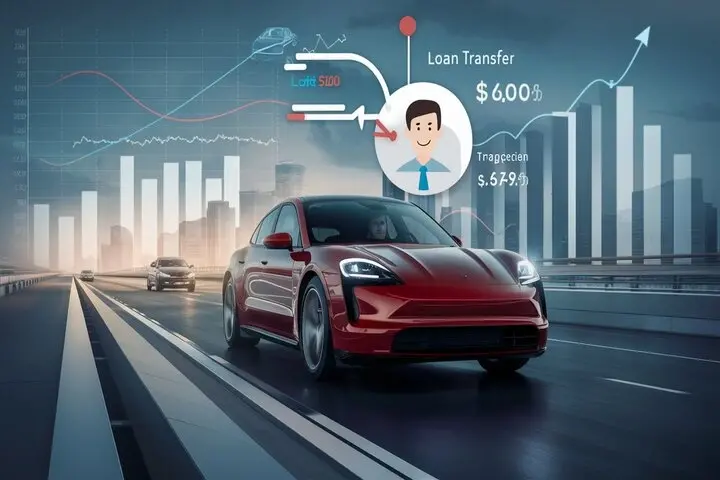Can I Transfer My Car Loan to Someone Else?

Now, suppose you have a vehicle loan but right now you find it difficult to pay the monthly dues. Legally, you could be able to assign the loans to someone else. Though it does not function in the way one simply passes the loan to another individual, car loan transfers are possible at times. When it comes to moving an auto loan, here are some important things you should know.
Car loans are a significant component of the automotive financing market since they enable consumers to acquire the required money to buy vehicles and let lenders profit via the set interest rates.
Transfer of a car loan is the process of changing the borrower's identity from the owner of the loan to the new owner but under whose responsibility the remaining balance is paid. Stated differently, you forward the car's title to the second buyer together with the loan's outstanding sum that the second buyer pays off.
This can only be done lawfully, though, after alerting the lender since the latter cannot remove you from the loan without consenting to a new borrower. The new buyer will have to complete the paperwork and obtain credit to assume the loan.
Your interest rate and loan length would not change when the new owner starts paying back the current loan under the terms as part of the loan assumption process. They essentially would replace you as the new loan borrower.
To which party should I pay off my auto loan?
You cannot sell your car, give the money to whoever you want, then return the loan. Usually, lenders have the following criteria for accepting a loan transfer:
The new borrower has to complete a loan application and satisfy lender credit requirements on their side. This provides confidence in the borrowers' financial capacity to pay back the loan.
The lending firm must clear the new buyer so that the outstanding loan can be accessed. The lender can refuse the transfer in cases when the loan amount is excessive given the client's income or credit score.
If someone received certain dealer or manufacturer rebates when the automobile was purchased, there could be restrictions on who a person can pass the warranty to. A few of the exemptions force the lender to keep the loan for a specific duration before selling or moving.
Still, most of the time the most simple procedures are those between family or spouses as most of the lenders approve of such transactions. But the financial capacity of the new buyer determines everything else.
That brings me to the second query about the mechanics of moving a vehicle loan.
Here are the usual actions to follow should you find a qualified buyer eager to assume your loan:
1. Determine Buyer and Bargain on Sale Conditions
What more search for a buyer for your car you have to do? Make sure you two have decided on the selling price and that the buyer is aware the current debt will be passed with the car.
2. You should give safety top thought by considering the following: Check Lender and Manufacturer Restrictions
Ask the lender whether there are any limits on the transfer and go over the loan paperwork they sent. You could have to satisfy prerequisites, time constraints, fees, or other limitations.
3. Three complete loan transfer paperwork.
The buyer will have to complete a full loan application, and the lender will take credit concerns into account. You might also have to complete any papers covering any state DMV requirements for ownership transfer.
4. Offer close sale to new buyer and loan transfer.
Should approval be granted, the lender will subsequently forward the finalized paperwork to you. I think there is no middleman necessary for the sale of the car itself. From the new date, the new owner starts paying back the loan debt.
Although most people in the current generation have a car loan, before you transfer yours, you should give some careful thought to various factors with both advantages and drawbacks.
Think about these possible benefits and drawbacks before moving your vehicle loan:
Advantages
Come out from under the plethora of payments; avoid being in a position where one must strain to find cash to pay an amount in full to clear the loan. Proceed with the loan terms under the new owner, the one making payments.
Cons;
Loan amount limits the number of interested purchasers; you are still liable should the new owner stop making payments; there is a tendency for large transfer costs to discourage companies from using this approach of talent acquisition while others find it very costly.
As you can see, there are several requirements to meet before one can try to transfer a current car loan. Before acting, find out how such behavior might affect your credit record and financial situation. If done right, nevertheless, it can allow one to sell the car without having the capacity to pay back the entire loan upon consenting.
Should I be unable to repay this debt, what other options are within reach?
Here are other choices should the lender refuse a transfer or you are unable to locate a qualified buyer:
Refinance: Working with your present lending business or any other lending company, refinancing is one of the strategies you can lower the monthly payments you pay. I would just advise you to be cautious about any closing costs and extension fees.
Voluntary repossession is the greatest approach to escape the unpleasant situation of having to keep paying the loan on the car. But it marks a loss of the car and erases your credibility.
Approach a third-party buyer and sell the house; then, use the proceeds to pay for the loan. You are personally liable for any remaining expenses, nonetheless, should they be due and call for payment.
In essence, auto loans provide the same option by allowing vehicle sales with the loan debt unpaid, therefore enabling you to purchase a car of your choice without a deposit. Still, make sure you only conduct such a move with lender permission; follow any established guidelines, and look for a buyer who can afford the house. On the other hand, done appropriately, it has been shown to lessen the burden of paying for an expensive car loan for both individuals.
Related Stories
Recent Posts
Understanding Your Finances: The Power of a Debt-to-Income Ratio Calculator
How to Repair a Low Credit Score: A Comprehensive Guide
Understanding FICO Scores: What’s a Good Score and Why It Matters
How to Prequalify for a Home Loan: A Step-by-Step Guide
Understanding Your Credit Score: A Comprehensive Guide to Credit Score Viewers



